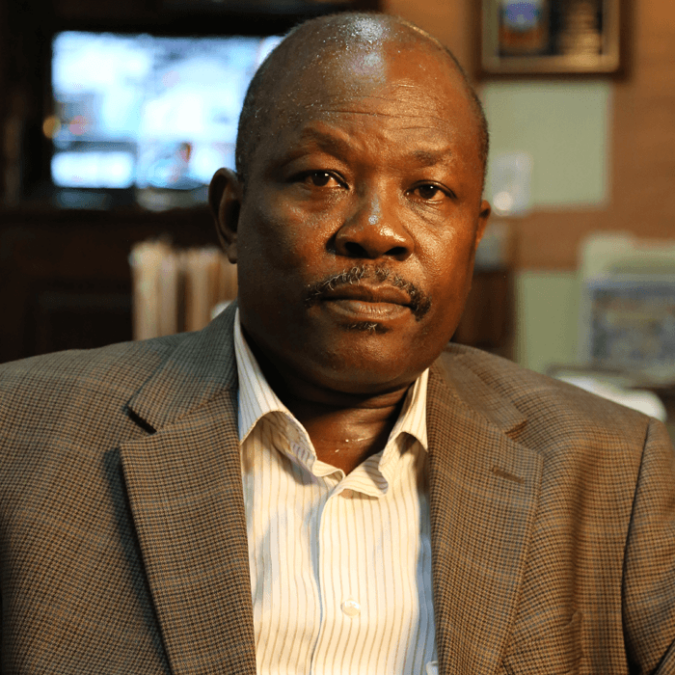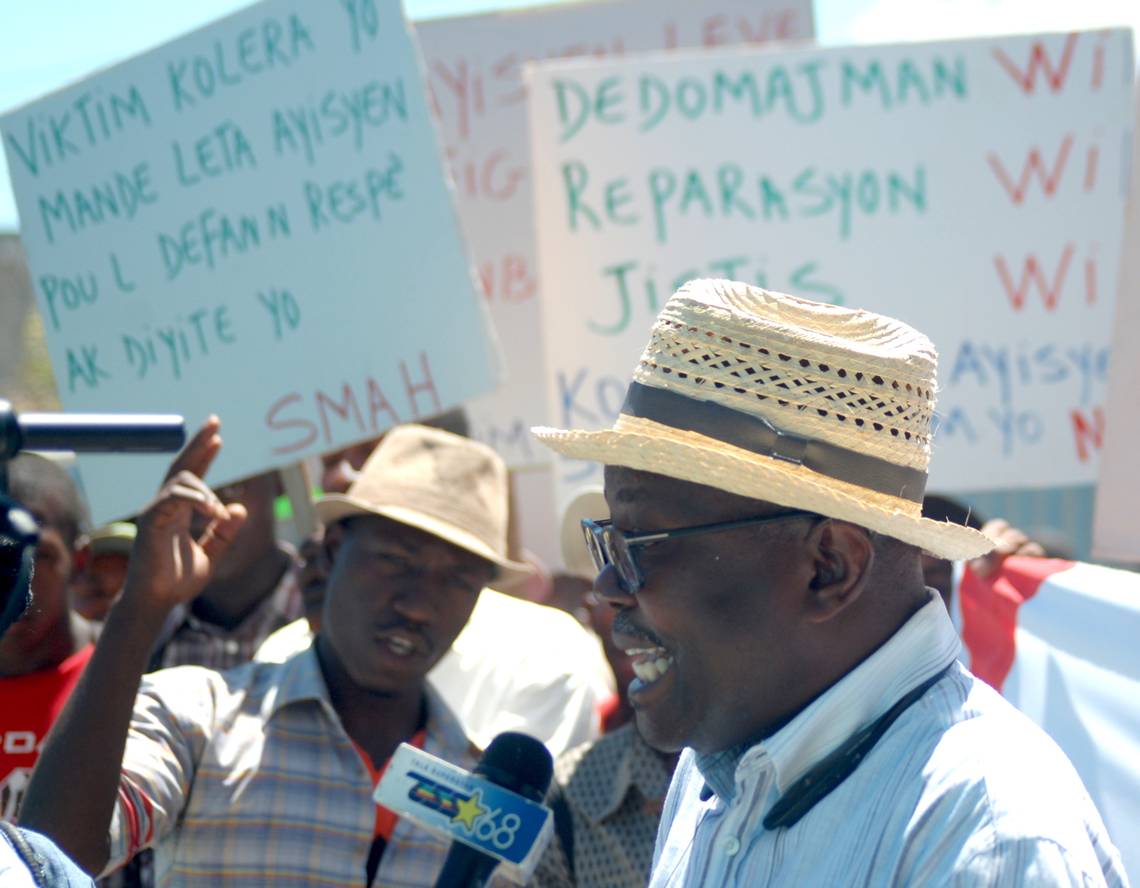
Originally Published in Miami Herald
By Jacqueline Charles
April 2, 2025
In a country where justice is often elusive, Mario Joseph was a fearless crusader who didn’t care whether his opponent was the Haitian government or the international community as he defended political prisoners and poor victims of human rights abuses in his Caribbean homeland.
That representation, which spanned three decades, included some of Haiti’s most high profile and emblematic legal cases, with the names of victims and abusers alike reading like a who’s who in the country’s vexing political trajectory. Joseph died Monday night from injuries sustained in a car accident last week as he pulled into his house. His death was confirmed by his longtime friend Brian Concannon and the Boston-based nonprofit Institute for Justice & Democracy in Haiti. He was 62.
“Haiti has lost its most prominent human rights lawyer at a time of overwhelming violation of basic rights,” Concannon, the nonprofit’s executive director, said in a statement. “The global human rights movement has lost an inspirational leader when the notion of human rights itself is under broad attack.”
Since 1996 Joseph had served as the attorney for the Bureau des Avocats Internationaux, or Bureau of International Lawyers, in Port-au-Prince. The organization represented victims of human rights violations, trained Haitian law students and worked with U.S. law schools clinics, while also closely collaborating with the Institute for Justice & Democracy in Haiti.
A celebrated lawyer, Joseph served as a trial attorney during some of Haiti’s darkest periods, which made him a go-to crusader for the families of victims of massacres and individuals wrongly persecuted by the Haitian government. His high-profile cases included championing the rights of 5,000 victims of waterborne-cholera who blamed the United Nations for its introduction into Haiti after the 2010 earthquake, and winning the freedom of Miami’s most well-known Haitian rights and immigration activist, the Rev. Gerard Jean-Juste, after he was jailed and accused of murdering a journalist in his homeland.
With Concannon, he also secured a guilty verdict and a landmark $140 million award for the victims of an April 1994 massacre in the seaside Haitian slum of Raboteau. People were killed after soldiers and paramilitary forces raided the neighborhood of Raboteau after a demonstration in support of former President Jean-Bertrand Aristide. Nearly 60 people were charged, and 16 were convicted in person, and 37 in absentia.
The case took four years to prosecute and it finally went to trial in 2000. A jury eventually found 16 people guilty in a landmark verdict. Though those convicted eventually escaped from jail and the case was later overturned by Haiti’s high court in a controversial 2005 decision, it led to the deportation of three former Haitian Army generals from the U.S., including notorious Haitian death-squad leader Emmanuel “Toto” Constant.
Constant was deported to Haiti in June 2020, nearly 26 years after fleeing the country with a U.S. visa via Puerto Rico. He had been a CIA operative and founder and leader of the Front for the Advancement and Progress of Haiti, which emerged after the military toppled Aristide in 1991. He and the group were accused of multiple atrocities, including the Raboteau massacres.
Another high profile client was former Haiti Prime Minister Yvon Neptune, who was running the country when Aristide was forced into exile in 2004. Neptune was jailed for more than a year by a transitional government without trial on charges of orchestrating a 2004 massacre of Aristide’s opponents near the western port city of St. Marc. With Joseph’s help, Neptune later took his case before the Inter-American Court of Human Rights.
“He was indefatigable in his crusade for human rights,” Neptune said, adding that he’s grateful for Joseph’s support before the human rights courts.

In a 2007 court brief in the U.S., Jospeh once described the challenge he faced as an attorney in Haiti, where the justice system was weak and corrupt. “High profile and complex human rights cases,” he said, “pose a challenge to the judicial system.”
Concannon said he has lost “a close personal friend and my principal collaborator for 29 years.”
The two partnered on many cases including getting charges dropped against Jean-Juste, who like Neptune had been jailed during the 2004-06 political transitional government in Haiti, which had accused the priest of murdering prominent journalist Jacques Roche after he showed up at Roche’s funeral.
“Haiti has lost one of the very few remaining authentic and valiant sons,” said Haitian-American rights activist and Miami Dade County Commissioner Marleine Bastien.
Joseph was “the voice of the voiceless, representative of poor women and girls, their only hope in a non-existent judicial system,” Bastien said.
While many of Joseph’s cases made headlines, like his claims on behalf of eight victims of former Haitian dictator Jean-Claude “Baby Doc” Duvalier and the women who had children fathered by U.N. peacekeepers, many did not.
“Mario Joseph’s contribution to the fight for democracy, justice and human rights in Haiti is legendary. Every day he fought for the Haitian people and endangered his life as a courageous lawyer fighting for their right to live in a democratic country,” said Ira Kurzban, a prominent U.S. immigration attorney who lives in Miami.
Kurzban, who for was active in Haitian causes for decades, worked with Joseph for more than 20 years.
“His loss is incalculable,” he said, remarking how, at the same time he was the lead attorney at the Bureau of International Lawyers, Joseph also worked with the Institute for Justice and Democracy in Haiti to develop a generation of young lawyers dedicated to protecting the civil rights of all Haitians.
Joseph had served as a member of the Law Reform Commission and was a member of the board of directors of the University of the Dr. Aristide Foundation, which called him “a staunch defender of justice and human dignity, a lawyer of rare bravery.”
Joseph graduated from Haiti’s leading teaching college and the Gonaives Law School. He was born in 1963 in Verrettes, Haiti, and grew up, like many Haitians, in a household with no running water and not enough food, a statement said.
“Although many of his neighbors and siblings never had the opportunity to learn to read, through perseverance, intelligence and good fortune Mario was able to obtain scholarships to high school and the national teaching university, then work his way through law school,” Concannon said.
Among Joseph’s many accolades over the years was the Judith Lee Stronach Human Rights Award from the Center for Justice & Accountability in San Francisco, the Alexander Human Rights Award from Santa Clara University, and honorary doctorates from the University of San Francisco and Indiana University School of Law. He was also a finalist for the 2013 Martin Ennals Human Rights Defenders Award.